“I’m just a car dealer.”
That’s what Douglas Ernest told me when I sat down with him to hear his story. It’s true, he is a car dealer. But his use of the word “just” is a bit off the mark.

Because it’s also true, objectively, that he is: a father; a US Army Captain (R) and combat veteran; a successful serial entrepreneur; the owner and builder of Corvette Warehouse[1]Corvette Warehouse–the largest dealership of vintage to late-model Corvettes in the southwestern US; a philanthropist; scholar; and published author.[2]The Spirit of a True Patriot: The Inspiring Story of Ret. Captain Douglas J. Ernest, 2024. All royalties and profits from this book are donated to veterans’ groups.
That’s quite a list of accomplishments–so far, because if you know Douglas, I think you’ll agree that by the next time you speak with him, there will likely be something new to be added to the list.
Because it’s relevant to this story, I need to tell you a little about my day job, and how I first met Douglas, back in 2019.
Fix it anyway, even if it ain’t broke
I’m a business school faculty member at a large public university near Dallas. I teach in our Executive MBA (EMBA) program, which is highly ranked, and competitive. The enrollees are fairly senior, with about 20 years of professional work experience, mostly in corporate settings.
Who we don’t see a lot of, are entrepreneurs who are already running their own successful business. Most such entrepreneurs–can’t say I blame them–are satisfied with their current success. Most such entrepreneurs, particularly those with families, are simply unable and/or unwilling to take on a rigorous graduate degree, while also running their own business. Douglas Ernest is not like most.
Douglas enrolled in our EMBA degree program in the fall semester of 2019. I told him that his returning to school, and his ‘fix it anyway, even if it ain’t broke’ mindset was rare, and inspiring. He seemed genuinely surprised.
“It’s funny you mention that,” he said. “I had thought it would be the normal trend or progression of someone that wants to do more things in life, and learn and expand their mind, and their horizons, and expand their boundaries.”
Would that it were so. Many aspire to be life-long learners and doers. Some, like Douglas, take that commitment more earnestly than others.
Now let’s rewind a bit.
Beginnings
Douglas Ernest was born in 1972 in Milwaukee, Wisconsin, in his words: “to young parents, who were both 17 at the time they had me. They did the best they could, as I believe most parents do, while they navigated the uncharted territories of parenthood and adulthood at the same time.”
A tireless work ethic, resilience, and patriotism–these are themes that run generations-deep in Douglas’ family. His Father “with a work ethic that was nothing short of Herculean,” worked three jobs: building auto frames for GM at the AO Smith plant,[3]The first, fully automated assembly line dates all the way back to 1921, and the “Mechanical Marvel” of AO Smith’s Milwaukee works. Eventually, the line was capable of producing a … Continue reading weeknights in an auto repair shop, and roofing and construction work on the weekends.
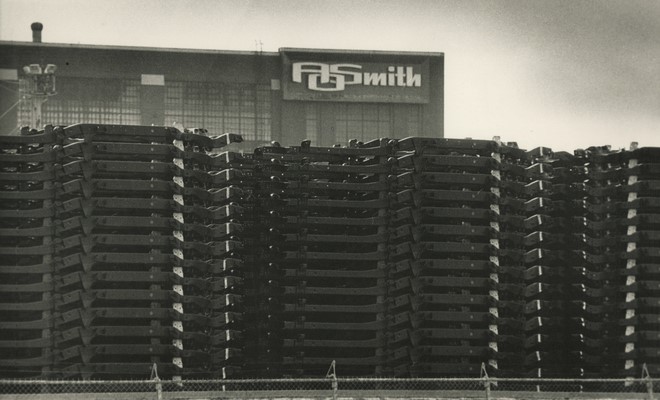
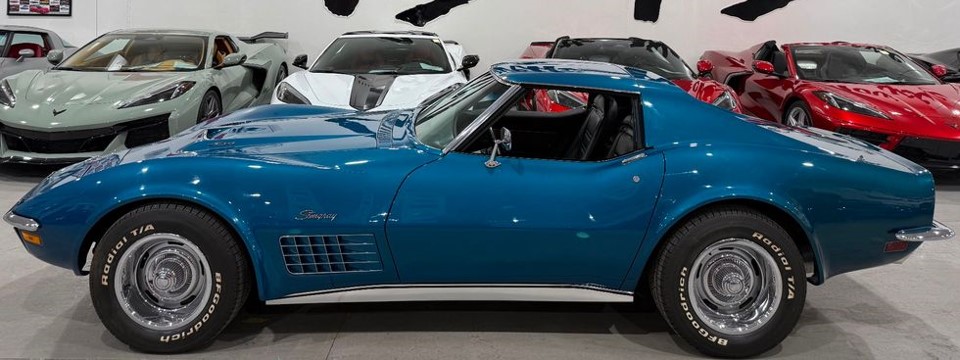
His maternal Grandfather, orphaned as a child, would later fight in the Korean war as an Army infantryman. His paternal Grandfather:
“…was an extremely resilient man who weathered the hardships of the Great Depression. His parents, immigrants fleeing the horrors of Nazi Germany, sought refuge in America during a time of profound global turmoil. In the context of their sacrifices and resilience, my own childhood experiences take on a new perspective.
Despite our modest means and residence in a challenging neighborhood, I realize how privileged, abundant, and rich our lives truly were. It underscores the enduring spirit of this nation and the endless opportunities it affords to those who come seeking a better life.”
Uncle Bob’s Shiny New Corvette
Another family member who turned out to be influential in Douglas’ life and career, was his Aunt’s husband, Uncle Bob.
“Uncle Bob had served in the army during the tumultuous Vietnam era…. A man characterized by meticulous organization and an unyielding attention to detail, he embodied traits that commanded respect and admiration in my family.
I recall a particular day, he arrived at our doorstep in a shiny, new, silver 1979 Corvette. The sight of that car left a deep impression on my young mind, sparking a determination that would shape the course of my life.
In that moment, gazing in awe at the sleek lines and polished charm of the Corvette, I made a solemn vow to myself. It was an inexplicable certainty that surged through me, a destiny I couldn’t yet fully fathom. I knew with perfect clarity that my life’s path would be intertwined with the world of the Corvette. It was a vision that kindled a lifelong passion and an ambition that would propel me forward through the years.”
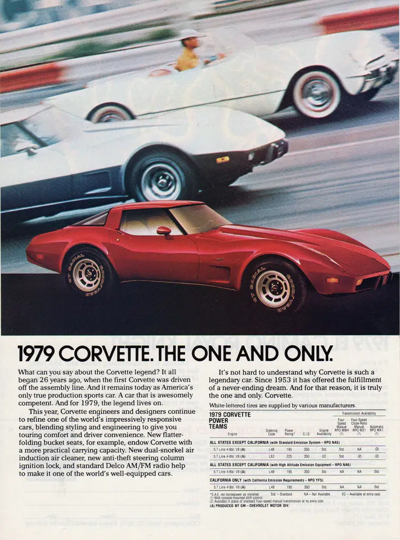
You’re in the Army Now
After high school, Douglas set his sights on university. The Army College Fund and the GI Bill could make that possible:
“These programs promised a path to higher education, providing $18,000 for those willing to embrace careers that were not always in high demand. For those who ventured into the realms of infantry, armor, or engineering, the allure of this substantial financial reward sparkled on the horizon. In that era, $18,000 possessed the transformative power to secure a four-year degree at a private school, the ticket to a brighter future.“
His Father was against his enlistment initially. His Father’s older brother John had been drafted during Vietnam, and the war had changed him. As he explained to Douglas: “Uncle John and I used to be so close before he was drafted. When he came back from his service, he had changed. He was someone completely different, and we were never the same again. I don’t want to lose you like that.” Ultimately, however, he deferred to his son’s decision. Of his Father, Douglas writes:
“It took the passage of 40 years of my life to unravel the enigma of his reluctance. Yet, even as I came to understand his reservations, I appreciated the depth of character that defined him. He never imposed his will or beliefs on others, allowing each of us the freedom to make our own choices, whether he agreed with them or not. His legacy was one of integrity, resilience, and the quiet strength that guided our family through the ebbs and flows of life.”
Life comes at you fast
Douglas was officially inducted into the US Army on June 30th, 1990. The day began early. Just past sunrise, he stood with his Father in the cool morning air outside their home in Milwaukee, both, he recalls, with tears in their eyes. A few minutes before six, the recruiter arrived and things moved quickly from there.
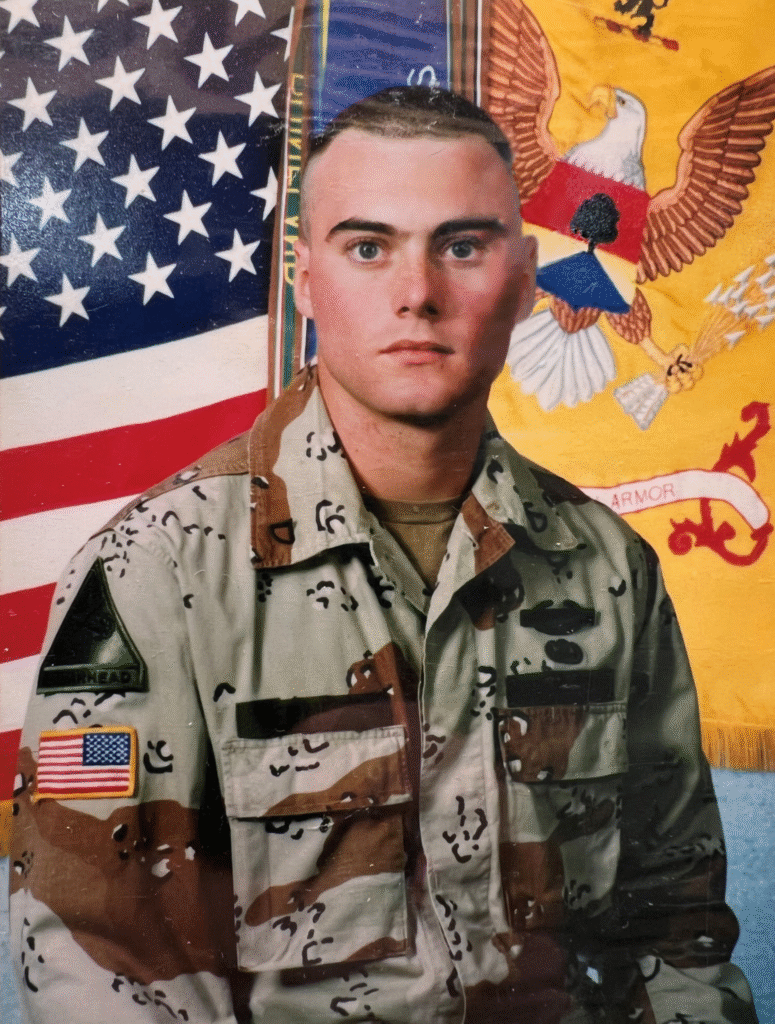
By later that same afternoon, he would find himself in the sweltering 105 F heat of a Georgia summer, crammed into the back of a cattle truck with a hundred other new recruits–vaccinated, uniformed, and head clean shaven, en route to his new home at Fort Benning.
One month later, the Gulf War began, and by Christmas time, following the completion of infantry training and airborne school, at 18 years of age, he was on the move again, this time for deployment into the eye of Desert Storm.
Deployment
With this project of mine, Dear Readers, I’m honored and entrusted with the stories of others. Among these stories, there are certain topics, events and life experiences, that are simply too important to be left to the words of surrogates.
And so, for a first-hand account of Douglas’ training and eventual deployment to the Persian Gulf–the terror, the tragedy and the occasional humor of it as well–I will refer you to Douglas’ book, The Spirit of a True Patriot. All royalties and profits from the book go to support veterans’ groups.[4]Proceeds from the book support these charitable groups: Cowtown Warriors, Hiring Our Heroes, National Coalition for Homeless Veterans, Four Block Foundation
Horned Frog
Upon his return from the Persian Gulf, Douglas applied to, and was accepted for admission to Texas Christian University (TCU) in Fort Worth, Texas. He was also awarded a special Army ROTC scholarship–one of only two given out in Texas that year, covering not only tuition, but also providing the recipients, as reservists, with the same level of training as those on full-time active duty.
The scholarship was generous, but the commitment was heavy: a 7-year contract, with this important clause that would be exercised sooner than expected: in the event of war or armed conflict, recipients could be called up to active duty at any time.
He did well in school, majoring in finance with a minor in real estate, but his passion for Chevrolet Corvettes remained strong. Back in those (mostly) pre-internet days, used cars were advertised in newspaper classified ads (remember those?) or in magazines like Auto Trader.
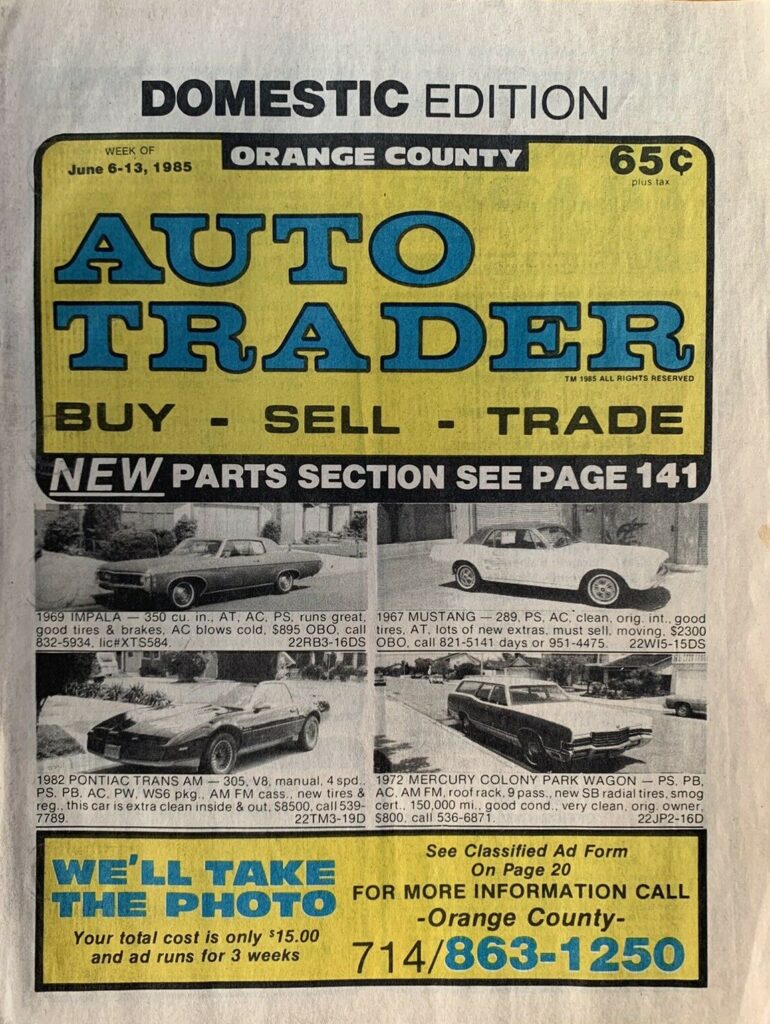
A few cars, Corvettes among them, were popular enough to have their own dedicated publications. The largest of these was Corvette Trader, and the TCU library just happened to have a subscription.
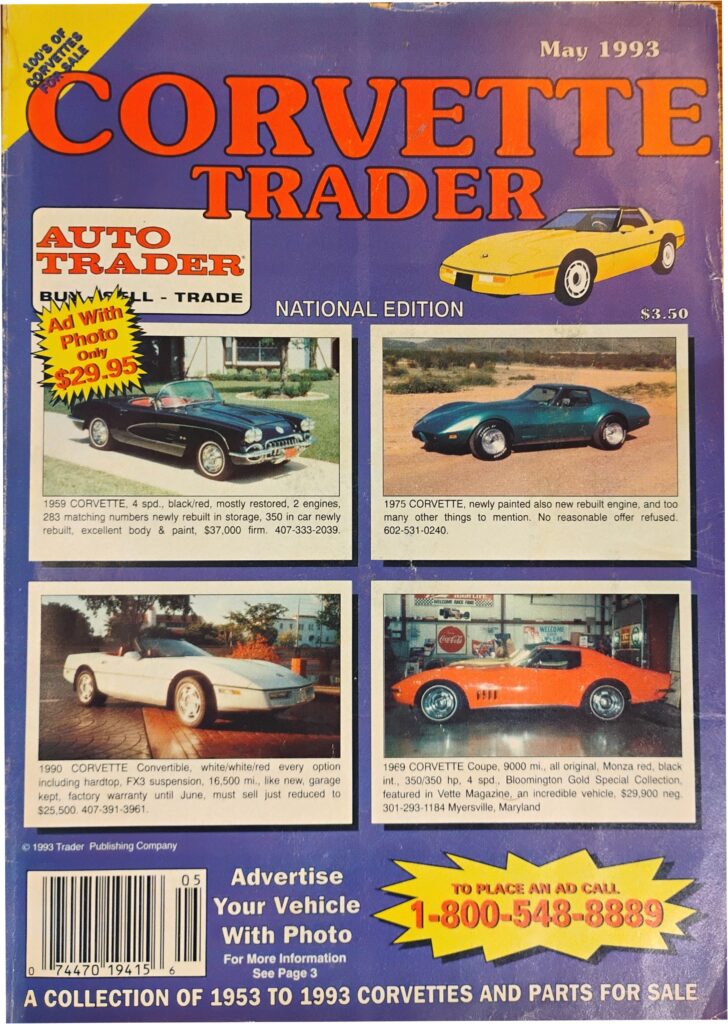
Entrepreneurial Spark
“There was a guy named Tony Visone. He had the largest Corvette dealership from the 80s up until the mid 90s. I was at TCU, and I was really interested in Corvettes and I thought this is cool. So I went and back then you had to go to the library and do research. You know, so you go to the library, get your book. I would get the Corvette Trader and he’d have like, 20 pages of ads in there. Everybody else had a little, little thing; he had 20 pages full of ads in there, largest Corvette dealer in the country back then. He had 300 corvettes. And, he had about 20 million worth of cars. Twenty million in 1990 was a lot more money than it is now. It’s probably 60 million now in today’s money. Well, I read about him and I said, wow, he went to Harvard. That’s so cool. Who the hell goes to Harvard and becomes a car dealer, you know? You’d read about him and his passion was cars.
“The most exciting purchase I have ever experienced.”
It’s not difficult to understand why Mr. Visone led the industry. Below is an image from the 22 full-page spread that appeared in the May 1993 edition of Corvette Trader.
A fore-runner to today’s online sales, the dealership would create and send potential customers a video of the car they were considering, then deliver it to their home after purchase, with paperwork complete. “Can’t find the time to visit us in person? You needn’t even leave your home !” read the headline–all in caps. Customers liked it too: “It was the most exciting purchased I’ve ever experienced.”
As I listened to Douglas’ story, and later while paging through an original copy of this ’93 Corvette Trader I was able to obtain (eBay for the win!), I wondered what it must have felt like for other dealers to have to compete with this guy. Sales hours 9AM to 11PM? Every day?
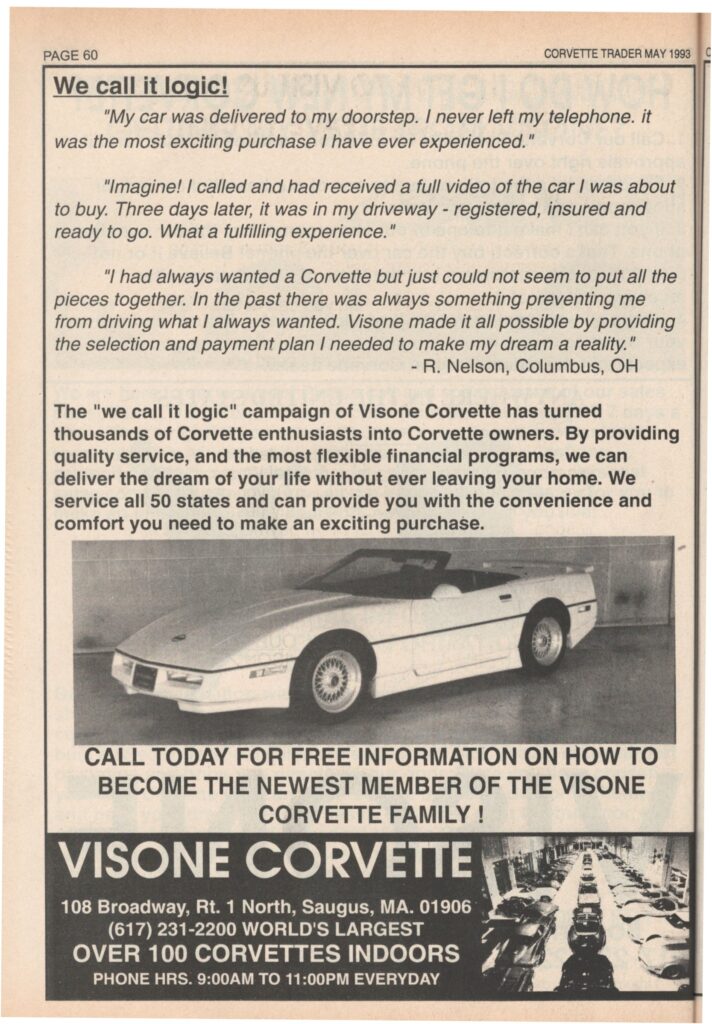
“You do not want to be a car dealer!”
Entrepreneurs are confident [5]If you’re interested, here’s one influential research paper on the topic, that Douglas (in scholar-mode–more on that later) referred me to: Busenitz, Lowell W., and Jay B. Barney. … Continue reading, sometimes to a fault. They’re optimistic and opportunistic. They don’t wait for opportunities to come along, they take action to create them.
So I wrote a paper about him [Visone] in TCU, and it was like 1994. And I wrote about how this entrepreneur, you know, started all these different things. And he found one thing that that worked, which was Corvettes. And then I had sent him that paper. Didn’t hear from him for a year or two. And then I’d reached out a year or two later. His office manager said ‘Oh, yeah, yeah, yeah. He, you know, he doesn’t take phone calls blah, blah, blah… and then he called, like six months later and said ‘You’re…just…find something else to do with your life! You do not want to be a car dealer!’ I said, but you’re worth a ton of money, and everybody in the Corvette business knows you. There’s nobody bigger. ‘…well I never thought of it like that!’ you know. And he’s like, ‘Well, you got to work all the time, and people are always after you, and they want to sue you, and you got all these problems and this and that…’
Despite Mr. Visone’s warning, his goals were long in the making, going all the way back to Milwaukee, to Uncle Bob and his shiny new ’79. He took a job at Visone’s Dallas location, near Interstate 35 & Royal Lane, working part-time after school.
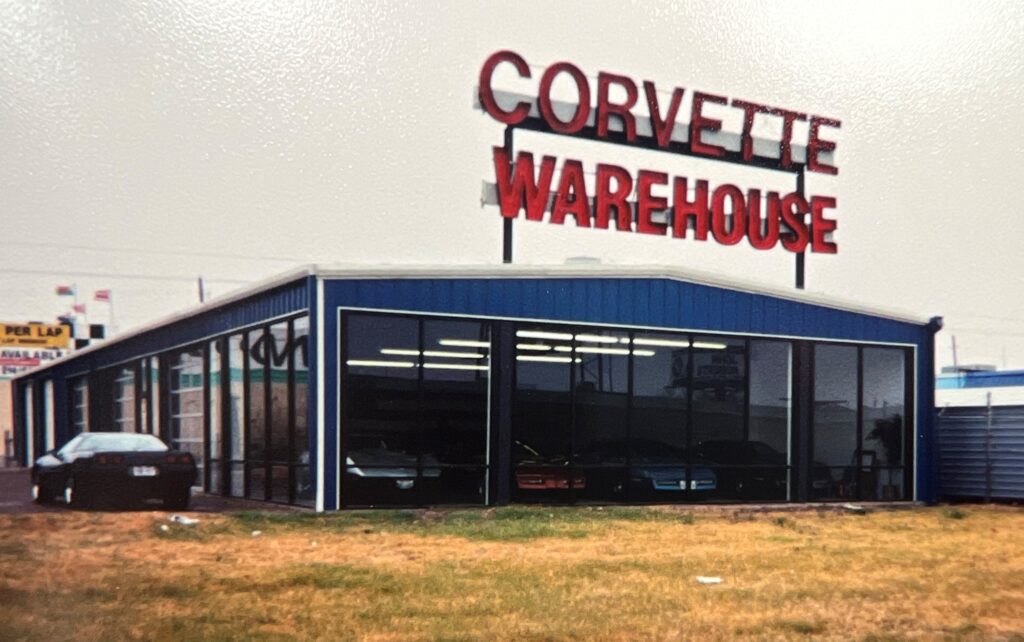
“He would let me work at night. I would come in at five after school and work till nine, ten, eleven, twelve. There would be nobody there and I’d be there working and it was fun. Not only was I, you know, doin’ something I loved, I was gettin’ paid. I didn’t sleep much, but I loved it.”
$300 a week plus commission
After graduation from TCU in 1996, Douglas had job offers in real estate and finance, but again decided to follow his passion, accepting a full-time position at the dealership in Dallas, for $300 a week salary plus commission.
Over the next three years, he would back and forth between the dealership, and getting called up for active duty.
“I would go for six months…come back, go for three months, come back, go for four months… He [Visone] wasn’t a veteran himself, but he supported it and he would always tell me ‘When you go, you go. You come back, things will be here when you get back, and we need you anyway.”
When at the dealership he rotated around various jobs. By this time, he was now the one writing the ads for the Corvette Trader, and learning all aspects of the business. “I was a jack of all trades.”
And we’re a small dealership. There’s only six employees…it’s, you know, when you’re a small business, everybody does a little bit of everything, you know. So you come in as sales, but then you end up working on what you’re good at. If you’re a techie, you end up helping them with the cars and you might do a little sales. If you’re a finance guy–I was a finance guy–I went from selling cars, to being in the office pushin’ papers, you know. I’d end up, you know, people would say, you know, ‘Hey, what’s the payment on that car?’ I’d say ‘Three fifty. If you lease, be three twenty, but a three-year commitment and you can’t get out.’
Opportunity knocks…for those willing to answer
By 1999, Mr. Visone’s enthusiasm for the business had begun to fade. He’d gone through a difficult divorce, got remarried, had a child on the way, and wanted to spend more time with his family. Living near his Boston headquarters location, he’d also gotten tired of the snow and the cold northeast winters. ‘We can’t sell cars year-round here,’ he grumbled.
By the following year Visone had relocated to sunny Palm Beach. He began liquidating the business, selling off his inventory of cars. But in what would turn out to be an opportunity for Douglas, he retained control of the real estate, including the location in Dallas.
Entrepreneurship isn’t for everyone. For the US workforce, entrepreneurs account for only about 16% of the total–a little less than one in five. Among those working at Visone’s Dallas location, only Douglas and the then-general manager had any interest in taking over the business.
“There was no one else there that wanted to do that…to become, you know, the risk taker…. Me and the general manager of the store partnered up. We put up our money, and back then it was about $100,000. We put up our own savings and we invested in our inventory.”
They signed a lease agreement with Mr. Visone for the Dallas facility and in the summer of 2001, Douglas and his partner celebrated the opening of their own Corvette dealership. Not bad for a kid in still in his 20s, just 5 years out of college.
The celebration, however, was short-lived.
“Lieutenant Ernest: Report for Active Duty in Two Weeks”
Just four months after launching their dealership, on September 11th, 2001, terrorists hijacked and crashed three civilian airliners in Pennsylvania, Washington and New York. Nearly 3,000 people were killed.
Nine eleven happened. About two weeks later, I got a letter that said, ‘Hey remember that contract you signed? You’re now on active duty! From here forward!’ And it said you’re leaving in two weeks. We had a business with about 30 cars in it. And it said you’re leaving in two weeks, and if you have any problems, we’ll notify your employer; we’ll help you with your employer. Let your employer know. And I said ‘Well I am my employer! I’m screwed!’
So I went to my partner and said ‘Hey, I’m leaving.’ And he said…they already knew me; I’d already already been workin’ with this guy for five years. And he said ‘Good luck, man.’ And remember, everybody was together at that time. The whole nation was supporting anything to do with defense because we were attacked at 9/11. And I thought this is my, this is what I gotta do.
I went to a place in Grand Prairie as a holding area where you went and you checked in, two weeks later. You checked in, no cell phone, no life, no connection to the outside world. Lock you up…started weapons training. They took us to Carswell, did weapons training. Took us in Mineral Wells, gave us like a month to prepare…
Rio Grande City: Preparing Kids for War
After completion of training, he readied himself for his next deployment.
They put me in a Rolodex and they said ‘you’re gonna just spin the wheel, and you’re gonna go wherever you go. That could be Afghanistan, could be Georgia, it could be Alaska, wherever they need ya.’ They spun the wheel and they sent me to a place called Rio Grande City.[6]Rio Grande City It’s about an hour outside of McAllen, east of McAllen.
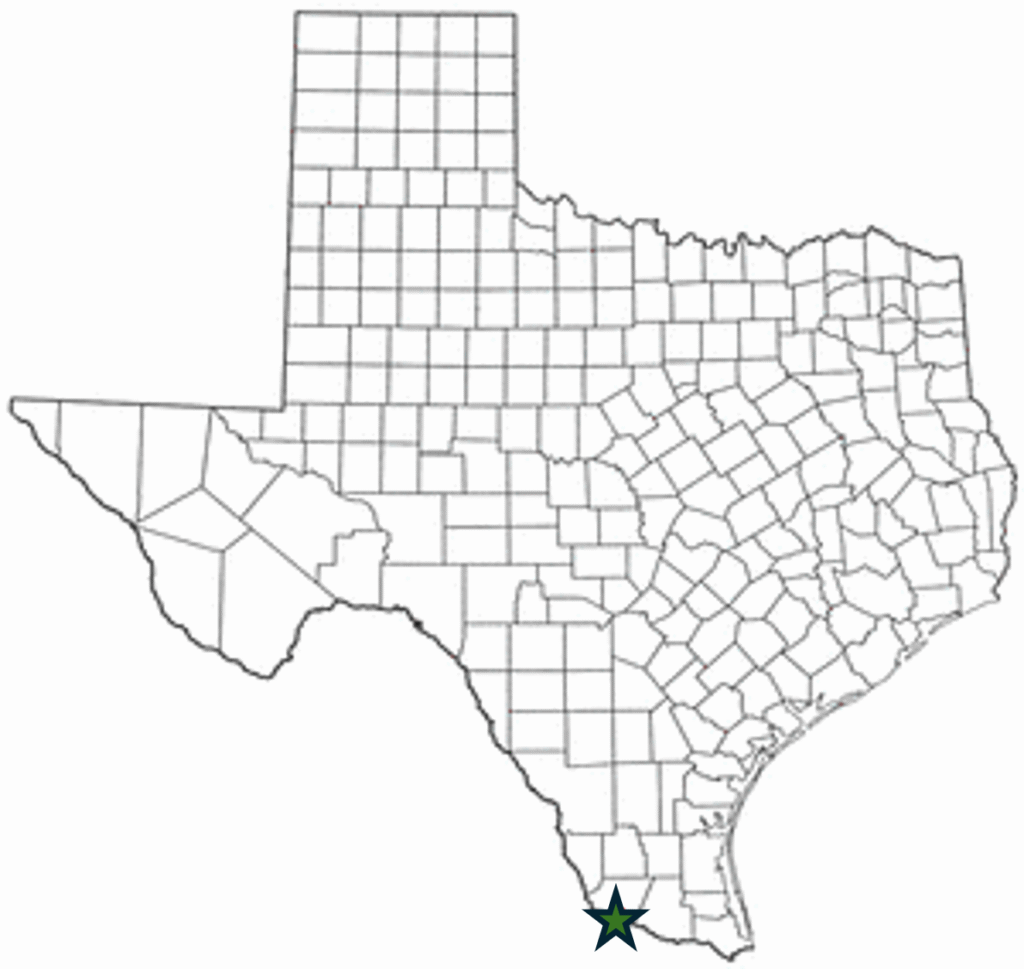
And there’s this little reserve unit there, with about 60 kids. And I say ‘kids’ because they’re…I’m twenty-four, twenty-five, twenty-six at this time, and these kids are eighteen, nineteen years old, that signed up to get some college money, and now they’re gonna be called up for war. And they told ’em ‘You’re goin’ to Afghanistan, and you’re leaving in three months. And you got Captain Ernest and Sergeant Garcia, are gonna train you how to go to war.’
That’s a pretty big responsibility. And I’m twenty-four, twenty-five, and my own business up north, and I’m uh…I got sent down there. There’s no barracks. They put you in a hotel, by the barracks. And they say ok, here’s all this beat up equipment, from WWII. Go fix it; go improve it; get it ready; get the tanks ready; get the tracks ready; get the water hoses ready–all this stuff that this unit does. It was a quartermaster unit, and quartermaster support…to support the infantry, the armor.
And I was selected for that position because I was a war veteran from Desert Storm. I went there, I was all in. I was working fourteen, sixteen, eighteen hours a day because I thought, man, these kids are going to go to war. If they don’t take it seriously, they’re going to die.
And you know only 90% [of those drafted] show up; 10% don’t show. They’re scared to death. You gotta go get ’em. You gotta go to their house. You gotta talk to Mom and Dad. And you gotta say ‘I know it sucks.’
My job was to go train these people, and then it would be wherever else they needed me. I was so fortunate that I did that and then they said ‘OK, you’re done. Go home.’ I did nine months, got promoted to Captain, and I thought, I’ll be in Afghanistan, you know, but they…they just put you in a rotisserie, and wherever your lucky your draw comes. And my draw was, you get to go home. ‘Do you want to go home or do you want to do you continue to go? You wanna volunteer?’ No, no, I wanna go home.
Re-building the business–again
By the time he returned to Dallas from Rio Grande City, his business had collapsed. After the September 11th attacks and the ensuing recession, the demand for luxury sports cars had plummeted. But the overhead and expenses continued unabated.
“The landlord, who was my old boss said, ‘Hey, I understand you’re having some problems, but you’ve got to pay your rent.’ So we had to pay bills, pay rent, paying interest, pay electric, pay all this stuff….”
The stress of it all took a toll, and his partner wanted out.
“And he had said ‘Hey, I’ll sell you my part of my company. I don’t want to do that anymore. It’s not fun. I don’t want to be an entrepreneur. I wanna be a paycheck kind of guy.’ And uh, me and Joe split up. I paid him off and I made payments for two years. I rekindled my relationship with Tony Visone and said, ‘Hey, I’m starting over.’
I had three cars again instead of 30, and I rebuilt it. And and I worked my…I worked my butt off like I worked at the army. I remember sleeping at the dealership. I would sleep outside in my car. I would meet people at nine at night, seven in the morning, whatever I had to do, and I rebuilt it, and it took about two years. It was like starting all over.”
Calm before the [next] storm
By 2005, the impact of the terrorist attacks and recession had faded, and Douglas and his crew had brought the business back once again. For the next three years, they enjoyed a period of relative stability and business growth.
The ‘Great Recession’ of 2008 brought that to an abrupt halt, with sales falling 40%. And once again, just as before, Douglas and his crew brought the business back.
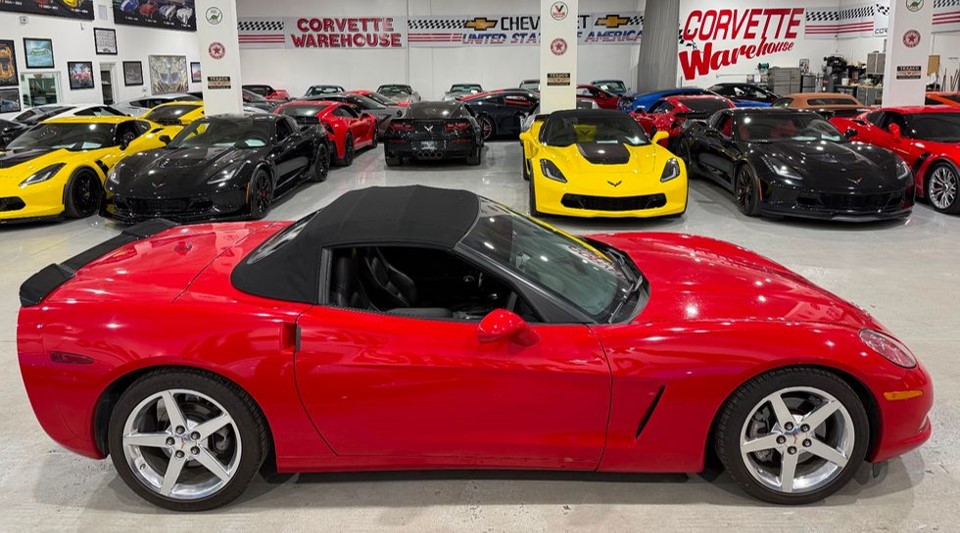
Do you see the pattern here?
Each of these events–Gulf War, September 11, the Great Recession, and more recently COVID-19–have followed a similar pattern for Douglas and the business: a triggering event, a precipitous decline in demand, followed by the inevitable credit crunch, but ultimately, a hard-fought recovery.

Each time, with the work ethic instilled by his Father and Grandfathers, and the mentorship and support of Tony Visone, Douglas and crew have not only weathered these storms, but rebuilt the business, bigger and better than it was before.
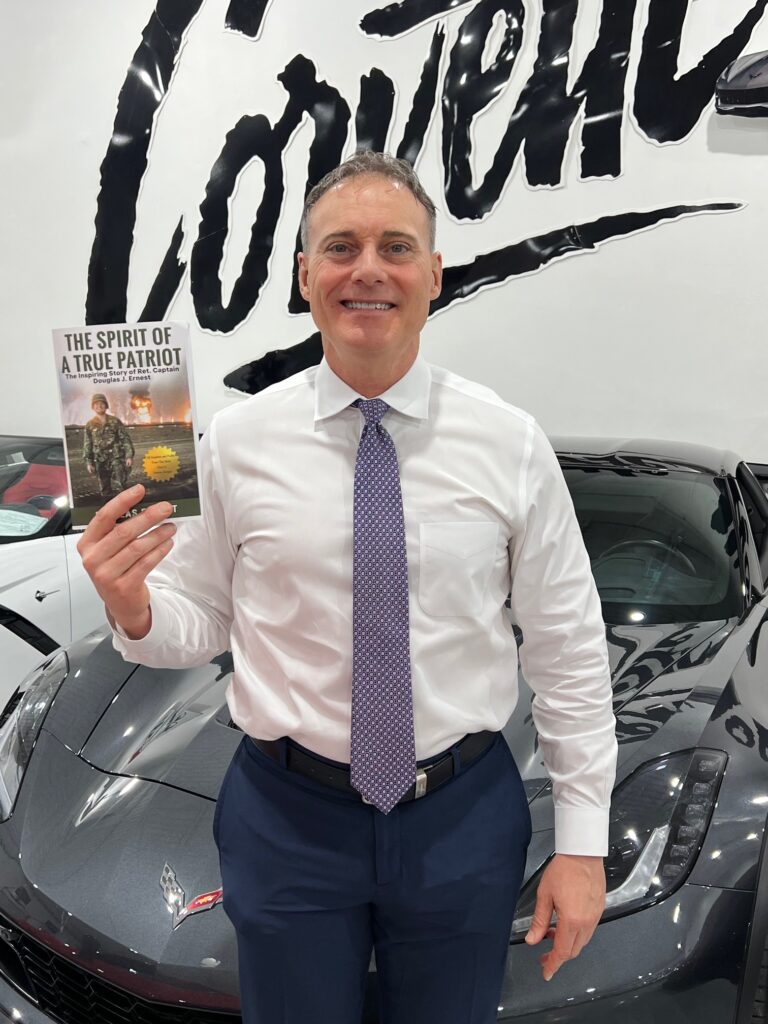
Today, Corvette Warehouse is one of the leading Corvette dealers in the southwestern United States. In the summer of 2024, he relocated to a new facility, doubling the size of his previous location, and now with 160 vehicles in inventory. At the time of this writing, April 2025, Douglas told me that he recently enjoyed his best month ever.
This seems like a good place to bring this inspiring story to a close. Except, this story is about Douglas Ernest. So as you might expect, it’s far from over…
A scholar emerges
Douglas graduated with his MBA in the spring of 2021, so upon my return to campus in the fall of that year, I was surprised to see a shiny new Corvette in the parking lot. ‘That looks like Douglas’ car. I wonder what he’s doing here?’
Later we crossed paths in the hallway and our conversation began like this:
Me: Great to see you! What brings you back to campus?
Douglas: I’ve enrolled in a couple of doctoral seminars this semester.
Me: Wait, what?
Here, Dear Readers, some additional context is in order.
The university where I work is a top tier institution. Many of our research faculty–no exaggeration here–are in the top 10% (or higher) of research faculty worldwide in their respective disciplines, as measured by their publication records.
And before going any farther, let me say that regardless of whatever views you may hold of academia, positive or otherwise, there is simply no question that this is high-level course work. In fact, within the discipline of management research, it is the very highest level of course work.
The classes into which Douglas had enrolled, were doctoral-level research seminars, attended by–exclusively, until his arrival–doctoral candidates. To gain admission to these seminars, he had to petition the faculty and senior members of the administration. And not because there was any explicit prohibition of non-doctoral candidates enrolling, it’s just not the kind of thing that anyone had ever done before. In fact, in my 12+ years at the university, not a single non-doctoral candidate that I know of, has ever been willing, and able, to do the work. None. But now, that number stands at one, and precisely one: Douglas Ernest. I imagine that for the foreseeable future, that number will remain at precisely: one.
Since then, and over the last couple years, I’ve watched a scholar emerge. Initially, I gave some advice on the structuring and writing of research papers. Now the research papers he writes, mostly on the topic of entrepreneurship, are clear and cogent; they are rigorous and research-backed; in other words, they are the work of a scholar. Initially, I was the one making suggestions and referrals to related strands of research. These days, those suggestions and referrals go both ways.
Not bad for ‘just a car dealer.’
And so, to the list of accomplishments, I can now add ‘scholar.’
To be continued…
Some of the stories that appear here have a clear and natural ending point, but not this one, and I think you can understand why.
Even now, there are accomplishments I could add to the list, like: ‘mentor.’ Douglas routinely sponsors student projects, giving freely of his time, and granting access to his business as well, providing real-world experience to aspiring managers and leaders. I could add: ‘loyal boss.’ Most of his senior management team have worked with and for him for more than 20 years. I’ve already added ‘father,’ but it’s worth a re-visit: Just last weekend, I went to an auto race with my Son. The pace car was a shiny new C8 Corvette. I snapped a photo and sent it to Douglas. A few minutes later, he responded with photos of his own, from the camping trip he was on with his family.
It ain’t easy to make it look easy
I’ve known a few successful entrepreneurs over the years. When talking with them, a first impression I used to have is that they made the extraordinary look ordinary, effortless even. But I know better now. Behind the ‘effortless’ success lies hard work, past failures, resilience, persistence, a bit o’ luck, and passion. Perhaps these words sound cliche? Often they are. But here, they emerge from actual lived experience.
Douglas described it this way:
“When people hear my story, and what made me who I am today, they’re often in disbelief at how much it took to get Corvette Warehouse where it is today. We’ve been through a lot, and around each corner, it has been a total thrill ride of emotions as well as excitement. The discipline that it takes to make it in business is less about what you’re made of and more about what you choose to do when you don’t get your way. You can be the strongest person and give up when the going gets truly tough. It takes consistent risk, fearlessness, and unwillingness to give in to the easy way out. It’s all about the decisions in the hardest of moments.”
Live Your Life in A Good State & Follow Your Passion
Until the next chapter, I’ll leave Douglas with the closing words.
References
| ↑1 | Corvette Warehouse |
|---|---|
| ↑2 | The Spirit of a True Patriot: The Inspiring Story of Ret. Captain Douglas J. Ernest, 2024. All royalties and profits from this book are donated to veterans’ groups. |
| ↑3 | The first, fully automated assembly line dates all the way back to 1921, and the “Mechanical Marvel” of AO Smith’s Milwaukee works. Eventually, the line was capable of producing a complete auto frame in an astonishing 8 seconds. At its peak, the overall facility was capable of producing 10,000 frames per day, and produced 2/3 of the frames used in the entire domestic auto industry. The line was designated as a historical landmark in 1979 by the American Society of Mechanical Engineers (ASME). |
| ↑4 | Proceeds from the book support these charitable groups: Cowtown Warriors, Hiring Our Heroes, National Coalition for Homeless Veterans, Four Block Foundation |
| ↑5 | If you’re interested, here’s one influential research paper on the topic, that Douglas (in scholar-mode–more on that later) referred me to: Busenitz, Lowell W., and Jay B. Barney. “Differences between entrepreneurs and managers in large organizations: Biases and heuristics in strategic decision-making.” Journal of Business Venturing 12.1 (1997): 9-30. |
| ↑6 | Rio Grande City |